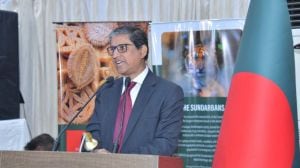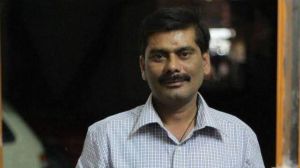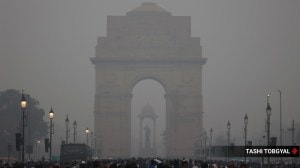On camera, a teen dies of heart attack during a coaching class: What triggered it? A cardiologist explains risk factors
The young should build a heart-healthy lifestyle early, says Dr Rajeev Bhagwat, interventional cardiologist, Nanavati Max Super Speciality Hospital, Mumbai
 People with risk factors for cardiac arrest should be aware of potential warning signs and consult a cardiologist if they experience any concerning symptoms. (Source: File/ Rep)
People with risk factors for cardiac arrest should be aware of potential warning signs and consult a cardiologist if they experience any concerning symptoms. (Source: File/ Rep)As an 18-year-old college student from Indore, Madhya Pradesh, collapsed to his death after a heart attack during a coaching session, questions have arisen about whether heart attacks can happen to somebody as young as him. This is particularly relevant for Indians, who anyway have an onset of heart disease symptoms at least ten years before other populations. And while screening among teens is not done, should they be more watchful about their routine of diet, rest, sleep and exercise, considering they are hemmed in by extreme performance pressure and stress during examinations?
What could have happened? Says Dr Rajeev Bhagwat, interventional cardiologist, Nanavati Max Super Speciality Hospital, Mumbai, “Heart attacks in the teen group can happen because of Hypertrophic Cardiomyopathy (HCM), usually a rare genetic disorder.” This condition stiffens up the heart muscle which cannot pump the required amount of blood with each heartbeat. Some people don’t have symptoms while others may only feel symptoms with stress, exercise or exertion.
“They may not be aware of their underlying condition till they experience discomfort. Some people may manifest symptoms when the blood vessels have already thickened. Usually, they get chest pain or discomfort with stress, have abnormal heart rhythms, develop extreme fatigue and lose consciousness suddenly,” he says.
PLAQUE RUPTURE AND FAMILY HISTORY
What many of us do not know is that plaques start forming as fatty streaks as soon as a baby is born. “If you are genetically disposed to fat accumulation in the arteries, they build up quickly. So a plaque rupture could happen among the young with his inherited condition rather early in life, triggering a heart attack,” says Dr Bhagwat.
SUDDEN CARDIAC DEATH
He doesn’t rule out the possibility of a sudden cardiac death. “Sudden cardiac death is often caused by faulty electrical impulses in the heart. A fast-paced heartbeat causes the lower heart chambers or ventricles to quiver instead of expanding and contracting to pump blood. We call this ventricular fibrillation. This results in a lack of oxygenated blood flow throughout the body, causing organ damage and death,” says Dr Bhagwat.
Any condition that puts a strain on the heart or damages heart tissue can increase the risk of sudden death. “Sometimes intense physical activity can trigger such arrhythmias in young people with an undiagnosed heart condition or with a family history,” he adds.
WHAT’S STRESS CARDIOMYOPATHY?
Even if one doesn’t have a family history, one can get stress cardiomyopathy, a condition caused by intense physical and emotional stress, that triggers a heart attack without any plaque rupture. Any student preparing for competitive exams in a coaching institute is usually given to extreme behaviours like not eating on time or not sleeping for hours on end. “When you experience a stressful event, your body produces hormones like adrenaline, excess amounts of which can overwhelm the heart. This can narrow small arteries that supply the heart with blood, reducing blood flow and triggering an attack. Sometimes adrenaline binds to the heart cells directly, causing large amounts of calcium to enter the cells. This then interferes with regular heart rhythms,” explains Dr Bhagwat. That’s why students need to eat properly, rest and sleep adequately and exercise. Lifestyle management should begin aggressively among the young, he says.
CAN SUDDEN DEATH BE PREVENTED IN THE YOUNG?
Depending on the underlying condition and family history, an investigation can reveal the condition of the heart. “Medication or an implantable cardioverter-defibrillator (ICD) may be put in the chest to continuously monitor the heart’s rhythm. Should heartbeats become abnormal, the ICD would sense them and immediately deliver electrical shocks to reset the heart,” says Dr Bhagwat. That’s why cardiologists are insisting on an early screening for those with a family history of heart disease in their 20s.
- 01
- 02
- 03
- 04
- 05































